Jul 7, 2021
Legal experts supported by Solidarity Center partner Labor Initiatives (LI), an organization representing and advancing worker rights in Ukraine, contributed recommendations that were incorporated into the country’s latest National Human Rights Strategy. The 2021–2023 strategy—a legally binding document to be implemented by state authorities in accordance with United Nations International Standards and Principals and Ukraine’s Association Agreement with the European Union—was signed into force by President Volodymyr Zelensky earlier this year.
Up to 100 action points are listed in the new strategy, including several advanced by LI lawyers Inna Kudinska, George Sandul, Katia Shvets and Nadia Yolkina in sections on freedom of association, worker rights, social protections, business and human rights, and anti-discrimination.
“The increasing significance of the LI team’s expertise is reinforcing its ability to make workers’ voices heard,” says Solidarity Center Ukraine Country Program Director Stanislaw Cieniuch.
Action points successfully advanced by LI to promote gender equality include: 1) Ratification of Convention 190, a new global International Labor Organization (ILO) treaty to prevent and address violence and harassment in the world of work that includes gender-based violence and harassment; 2) Amendment of the national labor code on equal pay and reduction of the gender pay gap; and 3) Development of national policies to shift the burden of proof in discrimination cases—including gender-based cases—from the employee to the employer.
LI’s lawyers also advanced action points for amending the country’s law on collective labor disputes, including ways to improve dispute resolution procedures and remove bureaucratic barriers preventing workers from exercising their right to strike.
“Labor is the defining part of life for every person,” reports LI. “[S]trong labor rights protections and rule of law are core safeguards to avoid catastrophic consequences for the people of Ukraine.”
Ukraine’s National Human Rights Strategy—first developed in cooperation with international organizations and civil society in 2015—is intended to develop a document that outlines citizens’ legal protections and to unite society around a common understanding of the value of human rights and freedoms to be protected equally and without discrimination.

Feb 23, 2021
Workers in Morocco are denouncing efforts by a Peugeot Citroen factory to force union leaders to resign from the Moroccan Labor Union (UMT) or lose their jobs. Already, one union leader has been fired, according to the union.

One worker was injured during a closed-door session with factory employers, according to UMT. Credit: UMT
Last week, factory management forced 11 union activists to sign resignation letters after compelling them to spend three hours behind closed doors where union leaders say they were subjected to questioning and harassment that seriously injured one worker.
“This violation of workers’ rights sullies the image of our country,” UMT says in a statement. “We call upon all local authorities to intervene in our case, and we call for the solidarity of workers at the company, and from unions across Morocco.”
Union members met in a general assembly over the weekend, where they stood strong for their rights to form a union and bargain collectively, and proceeded with planned union elections.
Over the past few months, the workers have protested the non-payment of overtime at the factory and waged a strike earlier this year at the plant in Kenitra, on Morocco’s northwestern coast. In 2019, Peugeot SA recorded more than $4 billion in profits.
The General Confederation of Labor (CGT) in France, which represents workers at Peugeot, supported the workers’ strike in Kenitra and vowed to assist them in their current struggle.
Union leaders say they expect management to announce this week whether the workers forced to sign resignation letters will be officially fired.

Dec 10, 2020
As garment factories shut down in Bangladesh during the novel coronavirus pandemic, leaving workers without wages or access to support services, unions and Worker Community Associations (WCAs) around the country rapidly shifted to address the crisis, with Worker Community Centers (WCC) serving as a lifeline for workers, their families and their communities.
The community associations and centers are part of an ongoing USAID-funded Solidarity Center Workers’ Empowerment and Participation project (WEP) launched in 2019 to improve working conditions for workers in the ready-made garment and shrimp and fish processing sectors in Bangladesh. The project builds on the strong foundation WEP established between 2015 and 2019.
In July, the Solidarity Center delivered 30,000 COVID-19 awareness leaflets to its partners in Dhaka and nearby Ashulia, Gazipur, Narayanganj and Savar; as well as Chattogram, Jashore and Khulna. The pamphlets, distributed to thousands of workers and community members by WCC coordinators and union federation organizers, highlight key safety measures during the COVID-19 pandemic, such as proper hand washing, social distancing and wearing masks at all times when outside the home.
“It’s important for us to do our part to get accurate information to everyone in the community to help stop the spread of this deadly virus,” says Rita Saha, WCC coordinator in Rupsha. “Our WCC leaders and members have extensive networks, and we love raising awareness and helping our community.”
Ensuring Fair Wages, Decent Working Conditions

When AFCO garment factory closed during COVID-19, workers received unpaid wages due to their union’s efforts. Credit: Solidarity Center
Even as WCCs and unions distributed resources, including food baskets to families of furloughed garment workers during Ramadan, they carried on the crucial work of ensuring workers receive fair pay during factory shutdowns.
As AFCO Abedin Garments Ltd. got set to permanently close in April without paying workers’ back wages, the Garments Workers Solidarity Federation (GWSF) launched negotiations with management and encouraged the Department of Inspection for Factories and Establishments and the Bangladesh Garment Manufacturers and Exporters Association to intervene. Ultimately, factory management agreed to pay the workers 60 percent of their April salary, one month’s base salary and 60 percent of the base wage for each full year of service. Eligible workers also will receive seven days’ annual leave.
In June, Hop Lun Apparels Ltd., Sammilito Sramik Union (HLALSSU) successfully negotiated a 24-point collective bargaining agreement with factory management covering more than 2,000 workers.

Union members at Hop Lun garment factory negotiated a contract that addresses gender-based violence at work. Credit: Solidarity Center
“When we submitted demands and negotiated with management, we gave special emphasis on the issues of women,” says Aklima, factory union president. “The guarantee of promotion of women to higher posts and the establishment of sexual harassment committee will empower the women and provide safeguards against sexual abuse and harassment in our factory.”
Training, Legal Support
The Workers’ Empowerment and Participation program also carried out leadership training and legal support that included advising more than 450 workers and winning $10,835 in court for 41 workers. Additional accomplishments over the past year include:
- 27,213 workers covered by unions in more than 200 factories
- 104 women elected to leadership positions
- 2,209 new community members actively participating in Worker Community Associations
- 21 new unions and worker-driven organizations in the garment and shrimp processing sectors and 12 new garment unions registered
- 39 worker-leaders trained in achieving gender equality or women’s empowerment at public and private organizations
“The WCC training sessions helped make me more confident and brave, and have helped me understand gender-based violence and harassment,” says one woman garment worker. “This has made it easier for me to handle tough situations at my workplace and in the community.”
Find out more about the Workers Empowerment Project.

Dec 3, 2020
Globally, marginalized workers have been especially hard hit by the novel coronavirus. Migrant workers in particular have experienced some of the harshest effects of COVID-19 and the related lockdowns, quarantines and travel restrictions.
Yet while the world has recognized “the bravery of frontline workers,” many of whom are migrants, “we must now turn that celebration into something that is meaningful and not just ephemeral,” says United Nations Secretary-General António Guterres.
We must ensure “fair and ethical recruitment, decent work, and access to health care and social protection without discrimination. It is also critical we promote financial inclusion of migrants and their families. We must address discrimination … migrants must not be stigmatized or denied access to medical treatment and other public services.”
Guterres spoke during release of the first UN Secretary General’s report on the Global Compact for Safe, Orderly and Regular Migration. Adopted in December 2018, the Global Compact sets out a cooperative framework for achieving safe, orderly and regular migration within a rights-based framework, and includes a process for implementation and review.
The report, part of the UN review process, focuses extensively on the effects of COVID-19 on the world’s 272 million migrants and the guidance the Global Compact offers in addressing the adverse effects on migrant workers.
Fewer Protections for Migrant Workers Under COVID-19
As borders and worksites were shut early this year, millions of migrant workers were stranded around the world, many trapped in crowded housing with no access to support, including access to food and other life-sustaining provisions. Many migrant workers were systematically denied social safety net protections like unemployment benefits or other forms of income support.
Others were forced to work in unsafe conditions, suffered from wage theft, and retaliation for speaking out about abuse. Origin countries frequently lack adequate health infrastructure, exposing those who returned to a greater risk of contracting COVID-19, or making it difficult for those who were infected to find care. Migrants returning in these conditions are also particularly vulnerable to exploitation, violence, stigma, discrimination and, without jobs, may be unable to support themselves or their families.
Although some governments took positive steps to voluntarily return migrant workers, according to the Global Compact report, many imposed even harsher restrictions. “The pandemic has been used by some [countries] to justify the increased and discriminatory use of immigration detention and to deport migrants without due process,” the report said.
The COVID-19 crisis also has worsened the situation for migrants in countries where they work. In Central Asia, the COVID-19 pandemic “exposed structural and institutional flaws in the way migration is managed in the region,” making conditions for migrant workers dire, according to a shadow report on implementation of the Global Compact in the Central Asian region. The shadow report cites such structural flaws as lack of work contracts that result in wage theft, no regulation of work hours and little or no access to health care or other social and legal protections. It was submitted to the UN by the Solidarity Center, the International Labor Initiatives (ILI), Insan Leilek and the Kazakhstan International Bureau for Human Rights.
The pandemic is especially hard on women, including the 8.5 million migrant women in domestic work, as well as lesbian, gay, bisexual, transgender and intersex migrants, the Global Compact report finds. Even as domestic violence is increasing during the pandemic, resources are being redirected away from sexual and reproductive health services. The Global Compact report points to the need for a gender-responsive, rights-based approach to migration all the more necessary.
Remove Barriers that Repress Migrant Workers’ Full Potential
Rooted in the UN Declaration of Human Rights and internationally agreed standards and frameworks, the Global Compact is grounded in rights-based policies and is a “call to build comprehensive, rights-based policies to ensure that migrants and their communities can thrive,” according to the report.
As such, “legislation should provide for ensuring the rights of migrants in accordance with international human rights standards, including fair and safe working conditions, the right to good rest, the right to access jobs without discriminatory procedures for obtaining the right to work,” according to a shadow report from Russian unions to the UN. “We believe that receiving countries should provide regulatory and visa flexibility for workers, especially during a pandemic.”
Noting the urgency for greater cooperation across borders during the COVID-19 crisis, including the integration of public health concerns into rights-based border governance, the Global Compact report recommends that member countries implement measures and practices in response to COVID-19 that ensure an inclusive public health response to suppress the virus and restart economies, protect migrants’ human rights and ensure the availability of lifesaving humanitarian assistance.
The report’s recommendations support the UN’s June 2020 Policy Brief: COVID-19 and People on the Move, which states that “the best way to recognize the important contribution made by people on the move to our societies during this crisis is to remove barriers that inhibit their full potential.
“This means facilitating the recognition and accreditation of their qualifications, exploring various models of regularization pathways for migrants in irregular situations and reducing transaction costs for remittances.”
Ultimately, as the report states: “The COVID-19 crisis presents an opportunity to reimagine human mobility for the benefit of all while advancing the central commitment of the 2030 Agenda to leave no one behind.” The report is in line with calls from the global labor movement, led by the International Trade Union Confederation, for a new social contract “between workers, government and business, which should include a floor of a universal labor guarantee for all workers.
“Implementing a New Social Contract would make sure that that rights are respected, jobs are decent with minimum living wages and collective bargaining, social protection is universal, due diligence and accountability are driving business operations, and that social dialogue ensures just transition measures for climate and technology.”
In short: A new social contract must include all workers, including migrants.

Oct 8, 2020
Delivery employees in Colombia who work for the online platform Rappi joined protests across Latin America today calling for decent wages, job safety and health protections for gig economy workers. Largely migrant workers from Venezuela, they provide essential services delivering food from restaurants and grocery stores to homes, including during the COVID-19 lockdowns.
The Rappi workers began to organize in response to fluctuating pay rates for individual delivery jobs, unexplained fines levied by the company, and the arbitrary barring of workers from the platform to accept jobs. Workers are seeking to unionize to address these issues and collectively defend their labor rights. Some 81 percent say their only source of income is by working for Rappi.
 Riding motorcycles and bikes through Bogotá, Medellín, Pereira, Cali, Barranquilla, Bucaramanga and Cartagena, the workers culminated their protest at the offices of the Labor Ministry in each city, where they presented a petition to form a union, Union of Platform Workers (UNIDAPP), to secure their fundamental rights on the job.
Riding motorcycles and bikes through Bogotá, Medellín, Pereira, Cali, Barranquilla, Bucaramanga and Cartagena, the workers culminated their protest at the offices of the Labor Ministry in each city, where they presented a petition to form a union, Union of Platform Workers (UNIDAPP), to secure their fundamental rights on the job.
“These platforms derive their profits from the exploitation of hundreds of thousands of men and women around the world who work without rest or protection. for miserable income,” UNIDAPP said in a statement today. “We are workers without rights who go out to the streets day by day to meet the primary needs of this society.”
Even as workers at Rappi struggle to support themselves, Rappi last month raised more than $300 million in a new round of investment involving international funds, such as T. Rowe Price Associates. Rappi operates in nine countries in Latin America. On Mother’s Day in May, more than 4 million Colombians used the Rappi app, as delivery services benefited from increased demand due to social distancing and lockdown restrictions.
Of the 50,000 Rappi workers, almost none are covered by the nation’s safety and health laws, according to a 2019 study, which found that 63.2 percent had suffered work-related accidents and 67 percent contracted occupational diseases in the past two years. At least three workers at Rappi were killed on the job so far in 2020, two from traffic accidents and one during an attempted robbery.
Like gig workers around the world who struggle with low pay, dangerous working conditions and arbitrary treatment, Rappi employees seek passage of laws protecting their rights on the job and labor contracts to ensure those rights are enforced.
Although several bills are now in the Colombian Parliament to regulate digital platforms and require gig economy corporations to provide some basic workplace protections, UNIDAPP rejects the efforts because they were not drafted with worker input and fall far short of the basic protections they need.
The National Movement of Digital Platform Workers (MNRPD) is filing suit on behalf of the workers, seeking recognition of labor contracts that ensure labor rights. The SC collaborates with the MNRPD and provides technical and legal assistance to reinforce the union organizing effort.
UNIDAPP is an affiliate of the Central Workers’ Union (CUT), which heralded the new union, saying “we have a duty to fight for what we want, full workers’ rights, decent conditions of employment and social protection.”
“Today, a new stage begins for platform workers in the country,” UNIDAPP stated. “We are a strong trade union organization ready to bring our demands to all judicial, legal and administrative bodies, until we have labor rights!”








 Riding motorcycles and bikes through Bogotá, Medellín, Pereira, Cali, Barranquilla, Bucaramanga and Cartagena, the workers culminated their protest at the offices of the Labor Ministry in each city, where they presented a petition to form a union, Union of Platform Workers (UNIDAPP), to secure their fundamental rights on the job.
Riding motorcycles and bikes through Bogotá, Medellín, Pereira, Cali, Barranquilla, Bucaramanga and Cartagena, the workers culminated their protest at the offices of the Labor Ministry in each city, where they presented a petition to form a union, Union of Platform Workers (UNIDAPP), to secure their fundamental rights on the job.